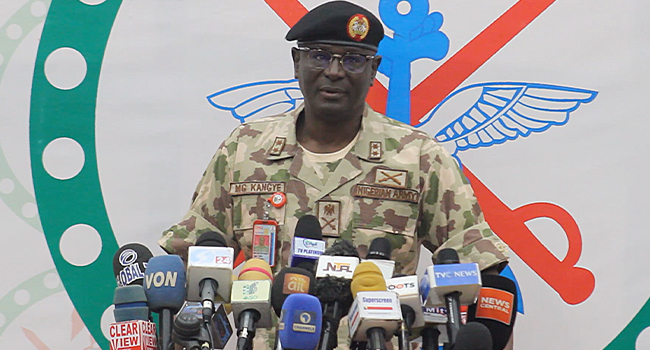THE Defence Headquarters (DHQ) has said the Armed Forces of Nigeria will continue to operate under its current Harmonised Terms and Conditions of Service (HTACOS), despite a recent National Industrial Court ruling that declared a key provision unconstitutional.
News Point Nigeria reports that on Tuesday, Justice Emmanuel Subilim of the National Industrial Court, Abuja, struck down the HTACOS provision requiring personnel to serve a minimum of 15 years before being eligible to resign or retire. The court held that the rule violated fundamental human rights guaranteed under the 1999 Constitution.
The case was filed by Flight Lieutenant J. A. Akerele, who joined the Nigerian Air Force in 2013. He alleged victimisation after his application to resign was denied, citing years of stalled career growth, abrupt changes in training, loss of seniority, and depression. In a landmark ruling, the court sided with him, describing the compulsory 15-year rule as “modern-day slavery under the guise of national service.”
The judgment has triggered widespread discussions within military and legal circles, particularly against the backdrop of growing unrest among service members.
In recent months, retired soldiers staged protests in Abuja over unpaid gratuities and allowances, while younger officers have increasingly voiced frustrations over welfare, promotions, and career stagnation.
However, in a press briefing on Thursday in Abuja, the Director of Defence Media Operations, Maj. Gen. Markus Kangye, said the Armed Forces would abide by the terms contained in HTACOS until the document is officially amended.
“The Armed Forces of Nigeria has a document which refers to our conditions and terms of service. In that document, everything regarding the disengagement of personnel is spelt out. Unless the terms and conditions of service are rewritten, we will still go by what is contained in that document,” Kangye stated.
He further clarified that military service is not uniform, as entry routes determine specific obligations.
Soldiers are recruited through depots.
Regular combatant officers enter via the Nigerian Defence Academy (NDA).
Short Service Commission (SSC) officers, open to graduates, serve as combatants but on limited terms.
Direct Short Service Commission (DSSC) officers, typically professionals such as doctors, accountants, and lawyers, serve under specialised obligations.
“Each of these categories of officers and soldiers serves under specific terms and conditions. Whichever applies to you at the point of entry is what governs your service until disengagement,” Kangye explained.
The military’s position sets up a possible clash with the judiciary over the enforceability of the ruling.
The case is expected to attract further legal battles, especially as more aggrieved officers and soldiers may approach the courts to challenge the existing service framework.
For now, the Nigerian military remains firm on its stance: until HTACOS is formally revised, its rules including the controversial 15-year minimum service requirement remain in force.







